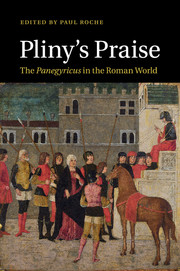Book contents
- Frontmatter
- Contents
- List of contributors
- Preface
- 1 Pliny's thanksgiving: an introduction to the Panegyricus
- 2 Self-fashioning in the Panegyricus
- 3 The Panegyricus and the Monuments of Rome
- 4 The Panegyricus and rhetorical theory
- 5 Ciceronian praise as a step towards Pliny's Panegyricus
- 6 Contemporary contexts
- 7 Politics and the sublime in the Panegyricus
- 8 Down the Pan: historical exemplarity in the Panegyricus
- 9 Afterwords of praise
- Bibliography
- Index locorum
- General index
3 - The Panegyricus and the Monuments of Rome
Published online by Cambridge University Press: 05 June 2011
- Frontmatter
- Contents
- List of contributors
- Preface
- 1 Pliny's thanksgiving: an introduction to the Panegyricus
- 2 Self-fashioning in the Panegyricus
- 3 The Panegyricus and the Monuments of Rome
- 4 The Panegyricus and rhetorical theory
- 5 Ciceronian praise as a step towards Pliny's Panegyricus
- 6 Contemporary contexts
- 7 Politics and the sublime in the Panegyricus
- 8 Down the Pan: historical exemplarity in the Panegyricus
- 9 Afterwords of praise
- Bibliography
- Index locorum
- General index
Summary
The paired issues of discontinuity and renewal were hot topics in the years following Domitian's assassination. Both Nerva and Trajan had been intimately connected with the Flavians and with Domitian in particular, but because of Domitian's uncompromising treatment of the senatorial aristocracy, it was expedient for his former courtiers to advertise a break from Domitianic policy, however distant this pretence was from political reality; and the emperor's subjects were keenly observing the public maintenance of this pretence. We have a partial glimpse of this phenomenon in an anecdote preserved from after 97 ce:
Idem apud imperatorem Neruam non minus fortiter. Cenabat Nerua cum paucis; Veiento proximus atque etiam in sinu recumbebat: dixi omnia cum hominem nominaui. Incidit sermo de Catullo Messalino, qui luminibus orbatus ingenio saeuo mala caecitatis addiderat: non uerebatur, non erubescebat, non miserebatur; quo saepius a Domitiano non secus ac tela, quae et ipsa caeca et improuida feruntur, in optimum quemque contorquebatur. De huius nequitia sanguinariisque sententiis in commune omnes super cenam loquebantur, cum ipse imperator: ‘Quid putamus passurum fuisse si uiueret?’ Et Mauricus: ‘Nobiscum cenaret.’
(Plin. Ep. 4.22.4–6)He [Junius Mauricus] spoke no less bravely in the presence of the emperor Nerva. Nerva was dining with a few companions. Veiento was nearest to him and virtually reclining in his lap. I said it all, really, when I named that man. Catullus Messalinus came up in our conversation. He had been deprived of his eyesight, and this handicap of blindness had intensified his savage inclination. He was unafraid, unashamed, unpitying: for that reason he was often launched by Domitian – not unlike spears which themselves are hurled blindly and with no sense of forethought – against all the best men. […]
- Type
- Chapter
- Information
- Pliny's PraiseThe Panegyricus in the Roman World, pp. 45 - 66Publisher: Cambridge University PressPrint publication year: 2011



